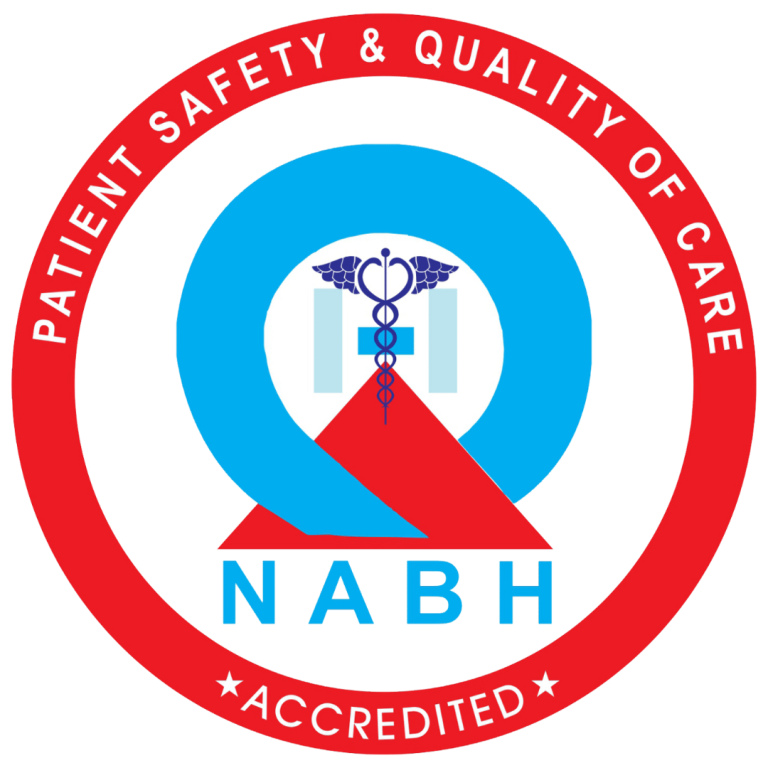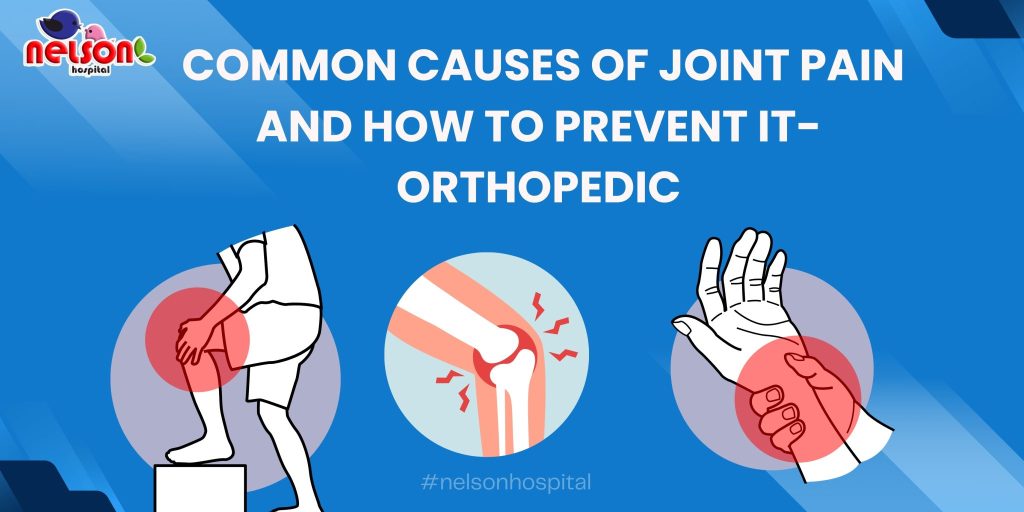
Joint pain is a prevalent issue affecting individuals of all ages. Common causes include arthritis (such as osteoarthritis and rheumatoid arthritis), injuries, overuse, and infections. Symptoms often encompass swelling, stiffness, and reduced mobility. Prevention strategies involve maintaining a healthy weight, engaging in regular low-impact exercises, practicing proper posture, and avoiding repetitive strain. A balanced diet rich in anti-inflammatory foods and adequate hydration also support joint health. Early diagnosis and appropriate treatment are essential to manage symptoms effectively and maintain joint function.
What is Joint Pain?
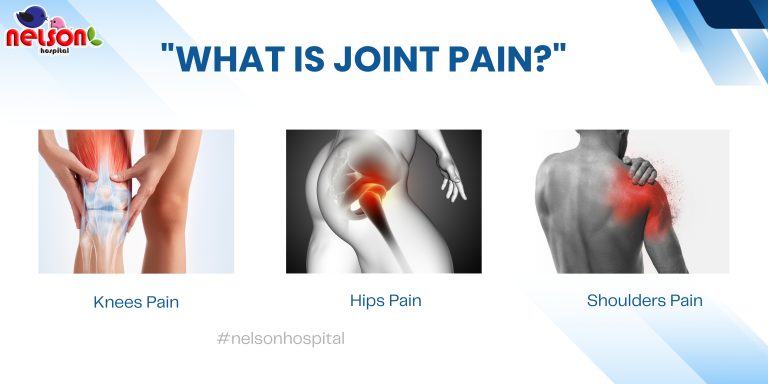
Joint pain refers to discomfort, aches, or soreness in any of the body’s joints— where two or more bones meet. It can range from mild irritation to severe pain that interferes with daily activities. Common causes include arthritis (such as osteoarthritis and rheumatoid arthritis), injuries, overuse, infections, and other underlying conditions. Symptoms often encompass swelling, stiffness, redness, and a reduced range of motion. While joint pain can affect individuals of all ages, it becomes more prevalent with aging. Early diagnosis and appropriate treatment are essential to manage symptoms effectively and maintain joint health.
Common Causes of Joint Pain
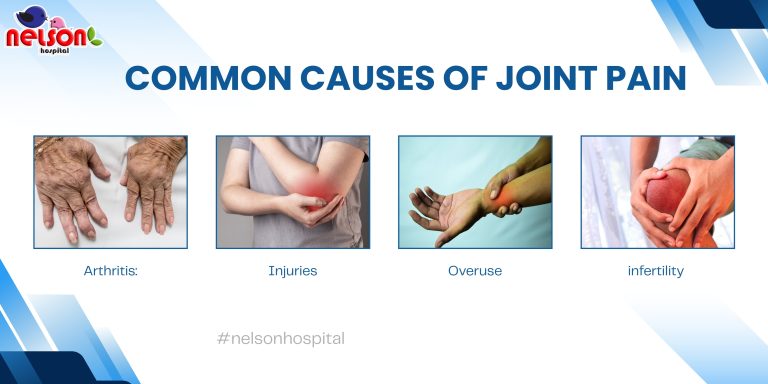
Here are some of the main reasons people experience joint pain:
- Arthritis
- Osteoarthritis: The most common type of arthritis, caused by wear and tear of joints over time.
- Rheumatoid Arthritis: An autoimmune disease where the immune system attacks the joints.
- Gout: Caused by the accumulation of uric acid crystals in joints, often affecting the big toe.
- Injuries
- Sprains, strains, fractures, and dislocations can damage joints and cause pain.
- Sports injuries are a major reason for joint damage in young adults.
- Bursitis
- Inflammation of the fluid-filled sacs (bursae) that cushion the joints.
- Commonly affects shoulders, elbows, and hips.
- Tendinitis
- Inflammation of tendons, the tissues connecting muscles to bones.
- Often caused by repetitive movements or sudden injury.
- Infections
- Viral or bacterial infections can lead to joint inflammation and pain.
- Septic arthritis is a serious condition that requires immediate medical treatment.
- Overuse
- Repeated movement or overuse of a joint can cause pain and stiffness.
- Occupations or hobbies that involve repetitive motion can contribute to overuse injuries.
- Other Medical Conditions
- Conditions like lupus, fibromyalgia, hypothyroidism, and obesity can increase the risk of joint pain.
Symptoms Associated with Joint Pain
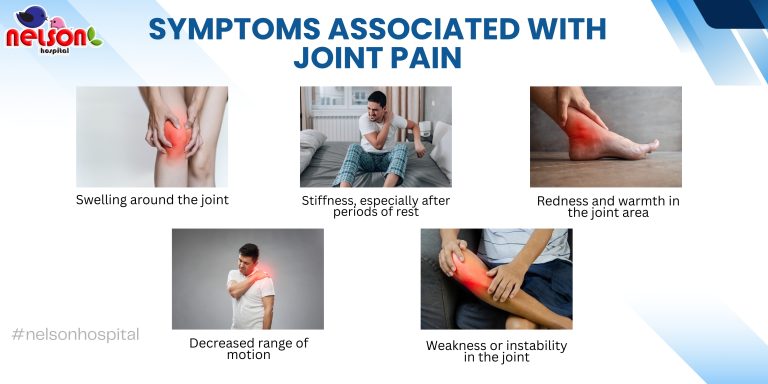
Joint pain can manifest in various ways, often affecting daily activities. Common symptoms include:
- Swelling around the joint: Indicates inflammation or fluid accumulation.
- Stiffness, especially after periods of rest: Limits movement and flexibility.
- Redness and warmth: Signs of inflammation or infection.
- Decreased range of motion: Difficulty in fully moving the joint.
- Weakness or instability: Feeling of the joint giving way or lack of support.
These symptoms can result from various conditions such as arthritis, injuries, or infections. Early detection and proper management are crucial to prevent further complications.
How to Prevent Joint Pain
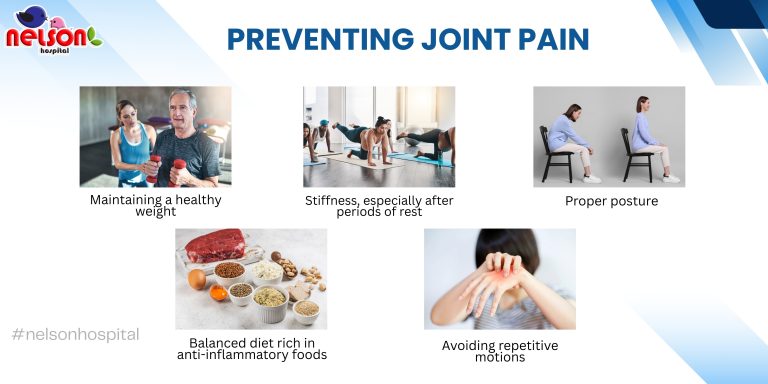
While some causes of joint pain cannot be avoided, there are steps you can take to protect your joints:
- Maintain a Healthy Weight
- Extra weight puts more pressure on your joints, especially knees and hips.
- Losing even a few kilos can significantly reduce joint stress.
- Stay Active
- Regular exercise strengthens muscles around joints and improves flexibility.
- Low-impact exercises like swimming, cycling, and yoga are joint-friendly.
- Protect Your Joints
- Use proper techniques while lifting heavy objects.
- Wear appropriate footwear and protective gear during sports.
- Eat a Balanced Diet
- Include foods rich in calcium and Vitamin D to keep bones strong.
- Omega-3 fatty acids found in fish can help reduce joint inflammation.
- Warm Up and Cool Down
- Always warm up before exercising and stretch afterward to prevent injuries.
- Stay Hydrated
- Drinking enough water keeps joints lubricated and healthy.
- Listen to Your Body
- Don’t ignore joint pain. Rest and seek medical advice if pain persists.
When to See a Doctor?
You should consult an orthopedic specialist if:
- Pain persists for more than a few days.
- The joint is visibly swollen or deformed.
- You experience a sudden loss of movement or severe pain.
- Fever accompanies joint pain.
How Nelson Hospital Nagpur Can Help You
At Nelson Hospital, we understand how joint pain can affect your life. Our Orthopedic Department offers comprehensive care for joint problems with a team of experienced doctors and advanced facilities.
Why Choose Nelson Hospital?
- Expert Orthopedic Surgeons: Highly qualified and experienced in joint care and surgeries.
- Modern Diagnostic Tools: On-site X-ray, MRI, and lab services for accurate diagnosis.
- Advanced Treatment Options: We offer medication, physiotherapy, minimally invasive surgeries, and joint replacement surgeries.
- Physiotherapy and Rehabilitation: Customized recovery plans to ensure a faster and better recovery.
- Emergency & Critical Care Services: Available 24/7 for injury-related emergencies.
- Personalized Care: We believe in treating every patient with care, compassion, and a customized approach.
Our Services for Joint Pain Management
- Consultation and Diagnosis
- Non-Surgical Treatments (Medicines, Injections, Therapy)
- Arthroscopic Surgeries
- Total Knee Replacement (TKR) and Total Hip Replacement (THR)
- Sports Injury Treatment
- Post-Surgery Rehabilitation and Physiotherapy
Frequently Asked Questions
What are the common causes of joint pain?
Joint pain can result from various factors, including:
- Arthritis: Conditions like osteoarthritis and rheumatoid arthritis.
- Injuries: Sprains, fractures, or ligament tears.
- Overuse: Repetitive movements or excessive strain.
- Infections: Bacterial or viral infections affecting joints.
- Other conditions: Gout, lupus, or fibromyalgia
How can I prevent joint pain?
Preventive measures include:
- Maintaining a healthy weight: Reduces stress on joints.
- Regular exercise: Strengthens muscles around joints.
- Proper posture: Prevents unnecessary strain.
- Balanced diet: Supports joint health with essential nutrients.
- Avoiding repetitive motions: Reduces risk of overuse injuries.
When should I see a doctor for joint pain?
Consult a healthcare professional if you experience: Persistent or severe pain.
- Swelling or redness around a joint.
- Limited range of motion.
- Fever accompanying joint pain.
- Inability to bear weight on a joint.
What treatments are available for joint pain?
Treatment options vary based on the underlying cause and may include:
- Medications: Pain relievers, anti-inflammatory drugs.
- Physical therapy: Exercises to improve strength and flexibility.
- Injections: Corticosteroids or hyaluronic acid.
- Surgery: In severe cases, joint replacement or repair.
Book an Appointment


